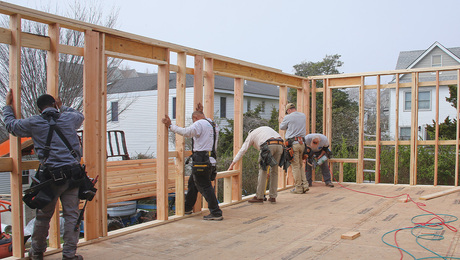I am just starting construction of a house – definitely not a pro. I have a very well-thought of contractor who builds only one house at a time. Our question has to do with vent placement. The soil elevation at the front of the house will be very close to the bottom of the joist band. The floor joists will run parallel to the front of the house. On all other elevations we will have 2-4 feet of exposed foundation walls.
Can we put crawl space vents in the front joist band, since all other vents will be below the band in the foundation walls. I quess our question is will the air flow be sufficiently restricted in the front vents by the presence of the first floor joist about 15″ from the vent opening?
The only other alternative is to put the vents in wells, which will require drains into the french drain system.
Thanks,
8



















Replies
>>The soil elevation at the front of the house will be very close to the bottom of the joist band.
Don't do it.
Soil levels never go down and, over the years, usually go up. Soil to siding contact should be avoided.
For crawl space venting, check out the Building Science website.
What and how depends on where you are located.
In my area, (NW Ohio) a conditioned crawl works much better than a vented crawl.
Actual performance of crawl space venting bears no relationship to the code requirements, in my area, at least.
"It is as hard for the good to suspect evil, as it is for the bad to suspect good."
-- Marcus Tullius Cicero, statesman, orator, writer (106-43 BCE)
Dear 8hcap,
#1, Be sure to lower the grade in front of your house, so that at least 8 inches (preferably more) of your concrete foundation protrudes above grade. The grade should slope away from the house, of course. If this is not possible, your foundation should be raised. If your house is already framed, and you think you can't lower your grade, you have a problem that should be discussed immediately with your builder.
#2, Sealed crawlspaces work better than vented crawlspaces.
seal a crawl space and ROT the structure,????
Hube,
There is plenty of research showing that a properly detailed sealed crawlspace will be less humid than a vented crawlspace. (1) Be sure grade is properly sloped and roof run-off is managed, (2) Install floor poly sealed with tape or mastic to the foundation walls, (3) Insulate the crawlspace walls with rigid foam, (4) seal all vents, (5) in some cases, provide some air exchange with the conditioned space above. Do a Google search on "sealed crawlspaces" if the concept is new to you.
FHB, Building Science Corp, and now JLC support you on the sealed crawl space isssue.
This month JLC has an article on rotting, mold invested crawl space remendiation.
Dave
Thanks for the replies. This is a lake house in good old (and humid) Alabama. The soil will not come in contact with the siding. My builder will waterproof the block wall and about 18" above the sill plate. All block will have natural stone laid with a flashed cap to direct the water over the stone. We have no inspections or even building permits. My wife is disabled, so we had to set the FFE as low as practical.
I have never seen a sealed crawl space down here and where you see significant water damage is when the crawl space does not have enough ventilation.
I think vent wells could allow more moisture penetration, particularly if the drains become clogged. Hence, the question about putting them in the joist band.
>>I have never seen a sealed crawl space down here and where you see significant water damage is when the crawl space does not have enough ventilation.
I don't know that area, so I can't say, but many construction types in my area would say that, except the repair guys and the home inspectors.
Don't ask a "new construction" guy, ask an experienced home inspector or guy who does regular repair work in crawl spaces; they see what works and doesn't work in your area every day.
General question: If sealing a crawl space casues rot and decay, how come all of the basements you see don't have rot and decay?
"It is as hard for the good to suspect evil, as it is for the bad to suspect good."
-- Marcus Tullius Cicero, statesman, orator, writer (106-43 BCE)